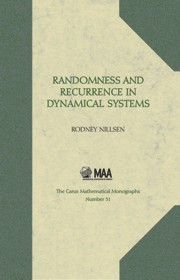5 - Averaging in Time and Space
Summary
All things began in order, so shall they end, and so shall they begin again; according to the ordainer of order and mystical mathematics of the city of heaven.
Sir Thomas Browne (1605–1682)Introduction: averaging in time and space
This chapter of the book is different fromthe preceding Chapters 2, 3 and 4. Its role is primarily expository, and introduces more advanced ideas, concepts, results and topics that proceed naturally from the preceding chapters. In particular, there is an exposition of parts of measure theory, and this is used to revisit some earlier topics and ideas, and to view them through the powerful lens measure theory provides. Some proofs are included, but most are omitted. An aim is also, in part, to present some motivations and underlying ideas in measure theory and ergodic theory that may not be found in the standard sources. The main theme is that of averaging in dynamical systems, with Birkhoff's Individual Ergodic Theorem as the main general result.
Results concerning averaging have been seen in earlier chapters. For example, Borel's Theorem 3.22 asserts that for almost all x ∈ [0, 1), and as n → ∞ 1, the average number of 1s appearing in the first n binary digits of x has a limit equal to 1/2. Similarly, the Normal Numbers Theorem 3.32 is a corresponding statement for the average occurrence of a given finite sequence of 0s and 1s in the binary expansion of a number. Like comments can be made for Weyl's Theorem 2.20 and the results dealing with Benford-type phenomena in Sections 3.15–3.17 of Chapter 3 (see also [4, 7, 12, 14, 21, 30, 34]).
- Type
- Chapter
- Information
- Randomness and Recurrence in Dynamical SystemsA Real Analysis Approach, pp. 288 - 350Publisher: Mathematical Association of AmericaPrint publication year: 2010

